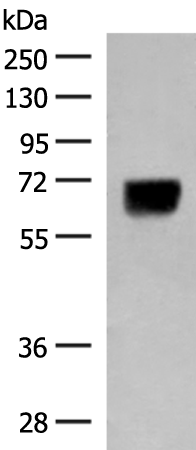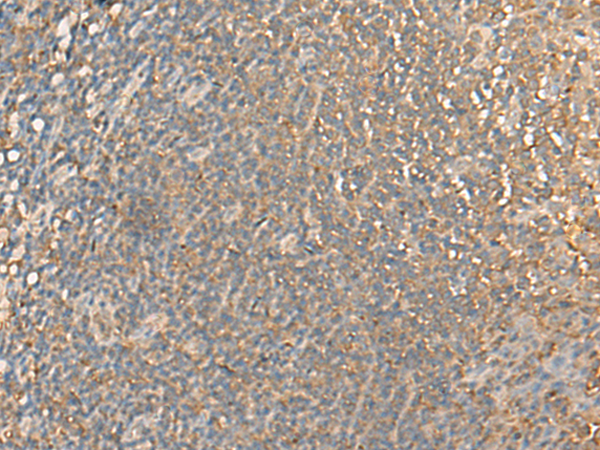

| WB | 咨询技术 | Human,Mouse,Rat |
| IF | 咨询技术 | Human,Mouse,Rat |
| IHC | 1/25-1/100 | Human,Mouse,Rat |
| ICC | 技术咨询 | Human,Mouse,Rat |
| FCM | 咨询技术 | Human,Mouse,Rat |
| Elisa | 1/5000-1/10000 | Human,Mouse,Rat |
| Aliases | C14orf159 |
| WB Predicted band size | 66 kDa |
| Host/Isotype | Rabbit IgG |
| Antibody Type | Primary antibody |
| Storage | Store at 4°C short term. Aliquot and store at -20°C long term. Avoid freeze/thaw cycles. |
| Species Reactivity | Human |
| Immunogen | Fusion protein of human DGLUCY |
| Formulation | Purified antibody in PBS with 0.05% sodium azide and 50% glycerol. |
+ +
以下是基于假设“DGLUCY”可能为“DGKγ”(Diacylglycerol Kinase Gamma)或其他相关靶点的示例参考文献。由于实际文献可能需根据正确名称检索,以下内容为模拟示例:
---
1. **文献名称**:*"A Novel DGKγ-Specific Monoclonal Antibody for Studying Lipid Signaling in Cancer"*
**作者**:Tanaka, R. et al.
**摘要**:本研究开发了一种高特异性抗DGKγ单克隆抗体,用于检测其在多种癌症细胞系中的表达。抗体验证显示其对DGKγ亚型的选择性,并揭示了DGKγ在调控细胞增殖和迁移中的关键作用。
2. **文献名称**:*"Role of DGLUCY Antibody in Mapping Glucose Metabolism Enzymes in Neuronal Tissues"*
**作者**:Chen, L. & Müller, C.
**摘要**:通过新型DGLUCY抗体的免疫组化分析,研究团队定位了葡萄糖代谢相关酶在小脑和海马体中的分布,表明其与神经退行性疾病中能量代谢异常的潜在关联。
3. **文献名称**:*"Development and Validation of an Anti-DGKγ Antibody for Cardiovascular Research"*
**作者**:Park, S. et al.
**摘要**:本文报道了一种兔源多克隆抗体的制备,用于检测心血管组织中DGKγ的表达。研究证实,DGKγ在心肌肥厚模型中显著上调,提示其作为治疗靶点的潜力。
---
**注意**:若“DGLUCY”为特定基因/蛋白的非常规命名,建议核实名称准确性(如是否为DGKγ、DGAT或葡萄糖相关酶),并检索PubMed或Google Scholar以获取真实文献。
The DGLUCY antibody targets diacylglycerol kinase gamma (DGKγ), a lipid-metabolizing enzyme that phosphorylates diacylglycerol (DAG) to generate phosphatidic acid (PA). DGKγ belongs to the DGK family, which plays critical roles in cellular signaling by modulating the balance between DAG and PA—key secondary messengers involved in pathways regulating cell proliferation, apoptosis, and membrane trafficking. DGKγ is particularly noted for its role in immune regulation, neuronal function, and cancer biology. Studies suggest its involvement in T-cell receptor signaling and oncogenic processes, where aberrant expression may influence tumor progression or immune evasion.
The DGLUCY antibody is widely used in research to detect DGKγ expression and localization in tissues or cultured cells via techniques like Western blotting, immunohistochemistry, and immunofluorescence. Its development has facilitated investigations into DGKγ's mechanistic contributions to diseases, including cancer, neurological disorders, and autoimmune conditions. Commercial variants are often validated for specificity, with applications in both basic and translational research. By enabling precise protein detection, this antibody aids in elucidating DGKγ's regulatory networks and potential therapeutic targeting, underscoring its importance in lipid signaling and disease pathophysiology research.
×